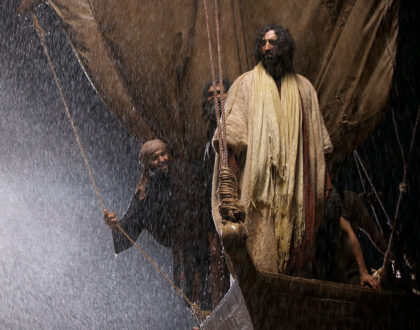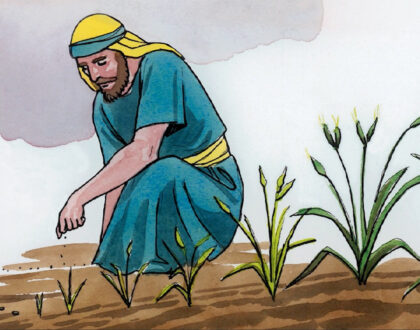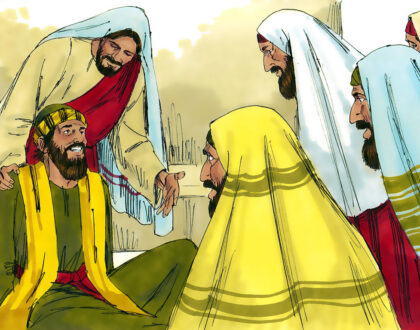Be Thankful and Prepared

“Be Thankful and Prepared”
Archbishop Loren Thomas Hines
22nd Sunday of Ordinary Time
November 12, 2017
Readings: Amos 5:18-24, Psalm 70
1 Thessalonians 4:13-18
Matthew 25:1-13
For most of us, life seems to have a lot of conflict and problems, and we desire to get away from them. We want that place of serenity, quietness and peace, but it doesn’t seem to come. The world is filled with difficulties. It seems like every week we hear of another mass murder somewhere in the world, and instead of getting better, things seem to be getting a lot worse. Someone came up with a theology that God will come and get us out of the midst of all this; that He would come and clean it all up Himself. They call it “rapture”. They wanted to get away from the problem. They didn’t realize what God did at the very beginning – that He gave man the responsibility over all creation along with all the power to handle all of this. Yet man has not learned or understood that and instead, he wants to get away from the problem. What God is waiting for is for man to rise up and be what God created him to be.
In the Old Testament reading from Amos, Israel had been redeemed by God. They had gone astray, were taken into captivity and after many years, God gave them the ability to rebuild Jerusalem and the wall. They were blessed, yet they forgot to give God thanks. They were going to the temple, paid their tithes, gave alms and sang their songs, but in their hearts they didn’t love God. They were doing all these only because they were told that they had to do them. What Amos teaches us in this writing is that all these outward actions are of no value unless they come from the heart. It’s easy for us to do some things that we don’t really want to do, like paying taxes. We resent it, yet we do it so the credit for it doesn’t really bring benefit because we don’t give it with the right attitude. We are told in Job, Isaiah and Jeremiah that when we find ourselves in difficulty, we shouldn’t run away from it because if we do, we’ll find ourselves getting into deeper trouble. Just prior to this particular reading for today, we read from Amos 5:14: “Seek good and not evil, that you may live; and thus may the Lord God of hosts be with you…hate evil, love good, and establish justice in the gate. Perhaps the Lord God of hosts may be gracious to the remnant of Joseph”. Here God was speaking to His own people. He had done much to redeem them and yet there’s no thanksgiving coming from them. They thought that if they went to the temple on feast days or offer their sacrifice of oxen and lamb, they’d be covered. So God told them “I hate your feast days”. He isn’t saying that festivals are wrong, but He hated them because their hearts were not in what the feasts were all about. The feasts were meant to give thanks to God, to bring Him praise and it wasn’t the offering of animals that counted but the heart that gave the offering. In the temple courtyard, the Lord saw the old widow giving her mite while a rich man came giving a huge amount. Jesus said that the old widow gave more than the rich man did because it wasn’t his heart that he was giving. His giving was wasted and was of no credit to him at all because his attitude was not one of thanksgiving and praise.
God goes on to say in Amos 5, “Nor do I delight in your solemn assemblies”. He’s saying that He doesn’t care whether we come or not on Sunday assemblies if our hearts are not right. If we go to church with the wrong attitude, that is, grudgingly or because we feel obliged, we get no credit for it and we may as well not go. “Even though you offer up to Me burnt offerings and your grain offerings, I will not accept them; and I will not even look at the peace offerings of your fatlings.” We may say 10 Hail Mary’s or give extra tithes but God won’t accept our peace offerings and give us peace if we don’t do these from the heart. God knows when we’re trying to bribe Him instead of offering sacrifices out of love. “Take away from Me the noise of your songs….” If your songs aren’t sung from the heart, God won’t receive them. We may think we’re doing things right but our hearts aren’t where they should be. “I will not even listen to the sound of your harps. But let justice roll down like waters and righteousness like an overflowing stream.” Be fair to each other. Care for one another. Don’t destroy; build. Don’t tear down; create. These are what God’s looking for. Righteousness should be a stream in your life – doing things the way God intended them to be, instead of doing what we want to do to please ourselves. “You were in the wilderness and you carried the tabernacle which you built with your own hands and yet what happened to you? You died in the wilderness because your heart wasn’t in what you were doing. You had no thanksgiving. I fed you; I gave you water and kept you well, yet you murmured and complained.”
Here in the Old Testament, God is getting our attention so we’ll get away from the things that destroy us. Yes, there will be problems, but didn’t God give us the promise and hope? Do we embrace the discipline? God’s speaking to us: “If you don’t do this, I will exile you”. Sometimes we wonder why our prayers aren’t being answered. We know that if we ask, we will receive. We ask but don’t receive. Why? Are we living out the life that’s pleasing to Him so that He hears our prayers, or like the songs we’re singing and instruments we’re playing that God doesn’t accept, He doesn’t hear our prayers because they don’t come out of the heart? We give our tithe but don’t get the benefit because our giving wasn’t done in love but out of a sense of obligation. In the beginning, God put the law on the outside but when Christ came, He put the law in our hearts. This should make us want and love to do His will, should make us want to devote our whole life to pleasing Him. This is what He’s asking of us. He’s asking us, “What’s your response to all that I’ve given you?” Can you imagine spending 40 years in the wilderness after being brought out of over 400 years of slavery? Wouldn’t you be thankful and give praise to God? But no; they murmured and complained. They didn’t realize that going through the wilderness was part of their journey to perfection and cleansing. They didn’t realize that they had to face the wilderness to prepare them for the Promised Land. They were crying for the rapture like most of the Church today. “Get us out of this! Lord, come rescue us!” But God is saying, “No, I gave you the power and authority and the responsibility. You take care of it.” Christ will return in glory when the Church has awakened. This is why He delays; we’re not yet giving Him what’s due Him.
In the epistle, there was a concern in the church at Thessalonica that those who died had failed. They were supposedly given new life by Christ, yet even with that new life they died; so they must’ve sinned and did something wrong. They forgot and Paul reminded them that Christ died on the cross but on the third day He rose again, so death wasn’t punishment but conquering and overcoming evil. Paul, with the inspiration of the Holy Spirit said, “I want you to understand this: when Christ comes back, He’ll come back with the dead because they’ve already faced the issues and so He brings them back first, then you’ll join them. They aren’t punished because they died; they’re given a special place. To be absent in the body is to be present with the Lord.” We haven’t fully comprehended the totality of God’s plan for us. The dead are blessed. Scripture says they are precious in the sight of God. Christ gave them new life and they will never die again. They faced the battle. They may have been weak. They may even have failed in our eyes but in God’s eyes, they did well. Do we ever stop to think that good people die because God wants them with Him? He leaves the evil ones behind to give them a chance to amend their ways.
The Gospel was written when the wedding ceremony was different from what they are today. Today when a couple gets married, they send out wedding invitations with details of when and where the wedding will be held. In the time of the Scriptures, a notice was given that there was to be a wedding without any indication of the time. Therefore you had to prepare yourself and get ready. But there was such an excitement for that event which involved the whole community. In the Gospel, they were waiting for the bridegroom to arrive so the virgins participating in the wedding were prepared but not involved. They were waiting, not knowing when the bridegroom would arrive. This speaks to us of several things and uses the events of the culture of the day to bring that understanding to us. Five of the virgins came prepared. They brought along extra oil because they didn’t know when the bridegroom would arrive. They also lived at a time when there were no street lights and they would never walk down the street without a lamp which served as their protection and guide. Five of the virgins, on the other hand, didn’t bring extra oil. While waiting, they fell asleep till someone came down the street crying out, “The bridegroom is coming!” The bride and the bridegroom go around the whole village, giving everybody a chance to greet them and be part of the wedding. This meant that the guests didn’t know how long this would take and how soon they would get to the wedding itself. Ahead of the couple would be someone crying out on the streets that the bridegroom is coming so the people would come out to greet them and the wedding guests would know that they were coming. In the Gospel, it was nighttime and when the virgins woke up, five lamps had gone out. They had no extra oil so they asked the others for some. Those who brought extra oil wouldn’t give the other five virgins some of their oil, so these five had to go out to buy some. While they were gone, the bridegroom arrived, the guests came in and the door was locked. I don’t know why they locked the door but I understand why they did. I remember our services in Magallanes. People would come late till we decided to lock the doors. We had seven services and people had to come on time or wait for the next service. Some people got really angry but if they didn’t come on time, that meant the service wasn’t important to them. In the Gospel, the five who were locked out knocked but the bridegroom said, “I do not know you”. If they were who they said they were, these virgins should have prepared themselves for the wedding, but because of their lack of preparation, they were locked out. That’s a principle used in this cultural setting to speak to us. We don’t know when Christ will return but when He does, we must have our lamp lit. We must be a witness to the world around us. We can’t be in darkness. If we aren’t living out our faith, we might be locked out. The fact that the virgins went to sleep could be interpreted that they died like all of us eventually will; but we need to be prepared even for that eventuality. If we’re not prepared we may find ourselves on the sidelines of major events that will take place afterwards. We must be prepared because we don’t know the time. We don’t know all the events that will take place but we put our whole heart into preparing, just in case. The oil can’t be shared. My salvation can’t be shared with you; it can’t take care of my family. They have to prepare their own oil.
This is Ordinary Time. God wants us prepared to be the witnesses that He wants us to be. After midnight is the darkest point of the day, whereas noonday is the brightest. They are opposites. When it’s the darkest, will we be ready to handle the situation? Do problems capture our whole being or does the promise of God’s help and deliverance make us face the problems with confidence? God promised and He won’t fail, but we can deny the promise if we give attention to the problem. We have a lot of problems and if we let them affect us, we might lose what we are preparing for. We live in a relationship with Christ. Do we know that we are the most valuable part of His creation? Do we understand how He loves us and is committed to us; that He has given us everything that we would ever need; everything pertaining to life and godliness? But are we accepting it or are we rejecting it because we don’t see it yet? We just have to wait. God doesn’t fail. All things work together for good. At the moment things may not seem good but we should have peace and believe that in the midst of it, something good will happen. We may not know when but we just focus on the good that God promised because it’s going to come. And when it does, it will have so much more meaning because it came out of the darkness and became light. This is the hope and the challenge that God gives us. We want to be what God wants us to be – seeking good and hating evil.
As we come to the end of Ordinary Time, we should already be putting many of the principles we learned to action by now. Hopefully we won’t ignore them like the five foolish virgins ignored the fact that they needed oil. They knew that it was dark and they couldn’t walk the streets in the darkness. They had to bring light with them but they chose to take a chance. Scriptures tell us not to tempt the Lord our God. If you look around us, you can’t help but believe that we’re getting close. It’s not a time to give up but a time to work harder, harder than we’ve ever worked before to make certain that out of our hearts will come things that will bring praise, honor and thanks to God. Let’s not be caught unprepared without oil. Let’s be prepared to live the life God has given us, to meet every situation whatever it may be. We have the ability to overcome. God is waiting for us to stand. He’s not going to take us out of the midst of the problem. He wants us to solve the problem, to find the answer so that we can give Him the glory.
Recent Sermons

Jesus, Calmer Of Storms
June 23, 2024

Harvest Time Stemming From The Smallest Seed
June 17, 2024

Not Bound By Limitations To Minister
June 10, 2024

